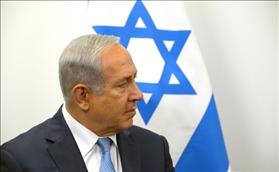The Prime Minister's NAY vote once again spoke volumes
Netanyahu about-faces on gay surrogacy rights
The surrogacy bill, enacted by a vote of 59 to 52, expands eligibility for state-supported surrogacy to include single women but excludes single men and gay couples. Until now the right has only been extended to married, heterosexual couples.
19/07/2018 09:56
Tags: Surrogacy Law · LGBTQ · surrogacy · Benjamin Netanyahu

Prime Minister Netanyahu, source: the Kremlin
Yesterday was the last day of the Knesset Summer session. It was a hectic day, emulating a legislative race to the finish line. Two bills in particular made the headlines: the Nation-state Law and the amendment to the Surrogacy Law.
The surrogacy bill, enacted by a vote of 59 to 52, expands eligibility for state-supported surrogacy to include single women but excludes single men and gay couples. Until now the right has only been extended to married, heterosexual couples.
What made the headlines was one element missing from the final product: the legal right to surrogacy in Israel for homosexual couples. This had been hotly debated in recent weeks, reflecting a growing public empathy for the rights of same-sex couples. The public has come to feel that there is no just reason to distinguish between heterosexual couples who are provided with an easy process for legal surrogacy, while homosexual couples are forced to travel overseas under challenging circumstances and at an extremely high cost that can reach a million shekels or more. Of notice is the fact that one of the young, outspoken (and up-and-coming) Likud Knesset members is an active member of Israel's LGBTQ community - MK Amir Ohana.
Responding to public pressure, Netanyahu publicized his support in a video clip widely distributed on social media. He said: “MK Amir Ohana... raised a simple point on the surrogacy bill. Single mothers [will have] the right to surrogacy and single fathers will not. This is simply not fair, and we need to fix it. And so I told him in the Likud faction meeting that I would support an amendment that he will submit.”
However, controversy was created when Prime Minister Benjamin Netanyahu voted against the amendment proposed by Likud MK Amir Ohana granting single men access to surrogacy… despite his public support for it.
The embarrassing reality (for the Prime Minister) was that when the time came for the vote, Netanyahu's "NAY" vote again spoke volumes of the deleterious impact that religiously motivated politicians (particularly the politicians representing the ultra-Orthodox parties) have on the political process.
The embarrassing reality (for the Prime Minister) was that when the time came for the vote, Netanyahu's "NAY" vote again spoke volumes of the deleterious impact that religiously motivated politicians (particularly the politicians representing the ultra-Orthodox parties) have on the political process.
It was MK Rabbi Litzman and his colleagues who had the upper hand, and their disdain and threats to retaliate against Netanyahu and his coalition dictated the outcome.
Hiddush's contribution to understanding the wide chasm between the public and its representatives (as they self-righteously claim to be, especially on religion-state matters) is to quantify public opinion on cutting edge issues. We commissioned a special poll last month on the very question of whether homosexual couples should be allowed to enter into surrogacy agreements in Israel. It revealed that 68% of Israel's adult Jewish population supports making surrogacy legally available to same-sex couples.
As we discuss this issue in a political context, of particular importance is the fact that a clear majority of the voters for the non-Haredi parties in the government coalition support this right, which was just voted down by their representatives. This includes 68% of Likud voters, 76% of Kulanu, 58% of Yisrael Beiteinu, and even 55% of the Jewish Home party's voters. Naturally, the level of support is even higher among the opposition parties: 92% - the Zionist Union, 85% - Yesh Atid, and 96% - Meretz.
The LGBTQ community responded with fury. The reactions from the grassroots include many individuals who have declared that they will refuse to report to IDF reserve duty, pay taxes, and participate in other forms of protest and civil disobedience.